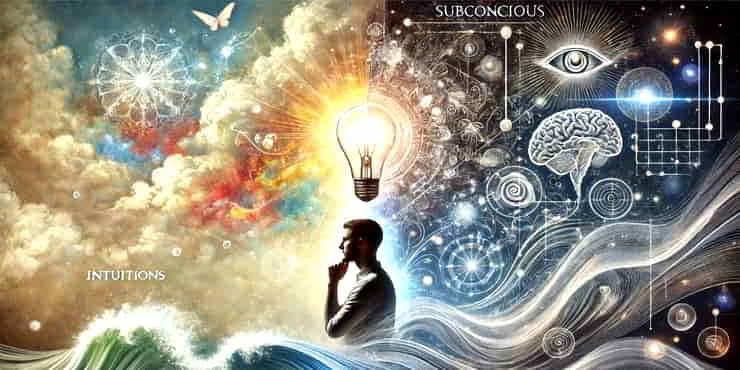Trust Your Intuition: Make Decisions with Confidence

Estimated reading time: 6 Min
Your mind’s quiet voice matters. Learn how to trust your intuition and to notice subconscious cues that guide smart decisions when logic isn’t enough.
Have you ever experienced a sudden flash of insight, a “gut feeling” that seemed to come out of nowhere yet proved to be surprisingly accurate?
That’s the power of intuition – usually a whisper, from the vast and often mysterious realm of your subconscious mind.
Here is an exploration into the science and significance of intuition:
- highlighting its relationship with the subconscious,
- its practical applications,
- and how you can use its power to make better decisions, enhance your creativity, and live a more fulfilling life.
The Brain: The Birthplace of Intuition
Our brains are intricate networks of neurons constantly firing and communicating, giving rise to our thoughts, emotions, and actions.
While we tend to focus on the conscious mind, responsible for logical reasoning and deliberate actions, it’s the subconscious mind that often holds the key to our intuitive capabilities.
Neuroscientists have identified specific brain regions, such as the anterior cingulate cortex (ACC), that light up during moments of intuitive insight.
This suggests that intuition is not merely a vague feeling but a distinct neural process.
What is Intuition? Decoding the “Gut Feeling”
“The intuitive mind is a sacred gift, and the rational mind is a faithful servant.”
Albert Einstein
For most people, intuition is just a mystical buzzword.
But it’s actually an output from a highly efficient information processing system.
Think of it as your mind’s way of making lightning-fast assessments based on patterns, experiences, and accumulated knowledge stored deep within your subconscious.
It’s a mental shortcut that allows us to bypass lengthy analysis and arrive at conclusions quickly, especially when faced with limited information or time constraints.
Importantly though, intuition isn’t meant to replace logical reasoning.
Instead, it complements it, providing a more holistic approach to decision-making.
As Albert Einstein famously said, “The intuitive mind is a sacred gift, and the rational mind is a faithful servant.”
By harnessing both intuition and logic, we can make well-rounded choices that consider both the big picture and the finer details.
The Subconscious Symphony: Unveiling Hidden Influences

The subconscious mind is a vast reservoir of memories, beliefs, emotions, and learned behaviours that operate beneath our conscious awareness.
It’s shaped by our past experiences, cultural conditioning, and even genetic predispositions.
This hidden, personal resource, exerts a powerful influence on our behaviours, decisions, and even our physical well-being, often without us realising it.
Think of it like an orchestra playing in the background of your life.
Even when you’re not consciously aware of the music, it sets the tone and rhythm of your experiences.
Understanding the subconscious mind is key to understanding intuition, as the two are inextricably linked.
Intuition in Action: Real-World Applications
Intuition plays a crucial role in various aspects of our lives.
In the business world, entrepreneurs often rely on their intuition to make bold investments or forge strategic partnerships.
In our personal lives, intuition can guide us towards fulfilling relationships and help us navigate complex emotional situations.
For example, consider a seasoned doctor who, after years of experience, can often diagnose a patient’s condition with a simple glance, even before running any tests.
Or a parent who instinctively knows when their child is upset, even if the child hasn’t said a word.
These are examples of intuition at work, guiding us towards the best possible outcomes.
Nurturing Your Inner Compass: Practical Tips to Boost Intuition
While some individuals seem naturally more intuitive than others, intuition is a skill that can be honed.
Here are some practical ways to cultivate your intuitive abilities:
- Mindfulness & Meditation
These practices quiet the mind’s chatter, allowing your inner voice to be heard more clearly. - Dream Analysis
Dreams are often windows into our subconscious mind. Keeping a dream journal can help you identify recurring patterns and symbols. - Reflective Journaling
Writing down your thoughts and feelings can help you gain deeper insights into your subconscious motivations and fears. - Spending Time in Nature
Nature has a calming effect on the mind and can help you connect with your intuition. - Trusting Your Gut
When you feel a strong intuitive pull, don’t dismiss it. Explore it with curiosity and openness.
The Shadow Side: Subconscious Fears and Blocks
While intuition is a powerful tool, it’s not without its challenges.
Our subconscious minds can harbour fears and limiting beliefs that can sabotage our happiness and success.
These can show up as self-doubt, procrastination, or even physical ailments.
Thankfully, various therapeutic approaches, such as hypnotherapy and cognitive-behavioural therapy (CBT), can help us identify and overcome these subconscious blocks, paving the way for a more intuitive and empowered life.
Embracing the Power of Intuition: A Future Full of Possibilities
As science continues to explore the mysteries of the mind, we are likely to uncover even more about the power of intuition and the subconscious.
This knowledge has the potential to revolutionise various fields, from education and healthcare to business and personal development.
By embracing our intuition and learning to work in harmony with our subconscious mind, we open ourselves up to a world of possibilities.
We gain access to a deeper level of self-awareness, make decisions with greater confidence, and live a life that feels more aligned with our true purpose.
FAQs: Intuition and Subconscious Mind
Can anyone develop their intuition, or is it an innate talent?
While some people might be naturally more intuitive, everyone can develop their intuition with practice and awareness. Techniques like mindfulness, meditation, and reflective journaling can help enhance intuitive abilities.
How can I tell the difference between intuition and fear?
Intuition often feels calm and clear, while fear tends to be accompanied by anxiety and stress. Learning to quiet your mind through practices like meditation can help you distinguish between the two.
Is there scientific evidence supporting the existence of intuition?
Yes, there is scientific evidence. Research in neuroscience has identified brain regions involved in intuitive thinking, suggesting it is a real and distinct neural process.
Can intuition be wrong?
Intuition is not infallible. It is influenced by our subconscious biases and past experiences. It’s important to balance intuition with rational analysis, especially in critical decisions.
How can I use intuition in my daily life?
You can use intuition in various ways, such as making decisions, solving problems, and understanding your emotions. Trusting your gut feelings and reflecting on them can provide valuable insights.
Summary
Understanding and harnessing the power of intuition can transform your decision-making, creativity, and overall sense of fulfilment.
By integrating intuitive insights with rational thought, you can navigate life’s complexities with greater ease and confidence.
Start cultivating your intuition today with simple practices like mindfulness and reflective journaling.
Ready to unlock your inner compass?
Begin your journey by incorporating mindfulness and reflective journaling into your daily routine.
Embrace the power of your subconscious mind and see how it can lead you to a more intuitive and fulfilling life.
I’d love to hear of your experiences – please share in the comments or contact form and social media.
😉
Richard
Useful Resources
- Books:
- Blink: The Power of Thinking Without Thinking by Malcolm Gladwell
- The Gift of Fear by Gavin de Becker
- Intuition: Knowing Beyond Logic by Osho
- Websites:
- Mindful.org – Resources on mindfulness and meditation.
- Psychology Today – Articles on intuition and the subconscious mind.
- Apps:
- Headspace: A popular app for mindfulness and meditation.
- Dream Journal Ultimate: An app to help you track and interpret your dreams.
- Insight Timer: Offers a variety of guided meditations to enhance mindfulness.
- Courses:
- Coursera: Courses on psychology and mindfulness.
- Udemy: Classes on developing intuition and subconscious mind techniques.
- Podcasts:
- The Mindful Kind – Focuses on mindfulness and intuitive living.






